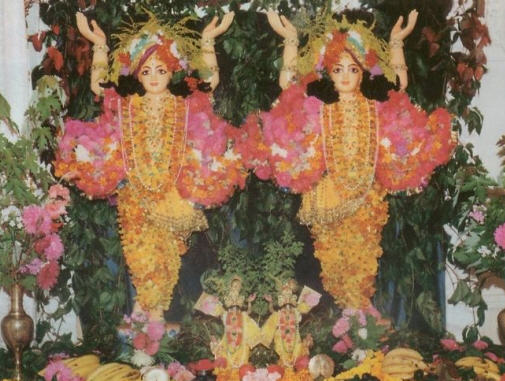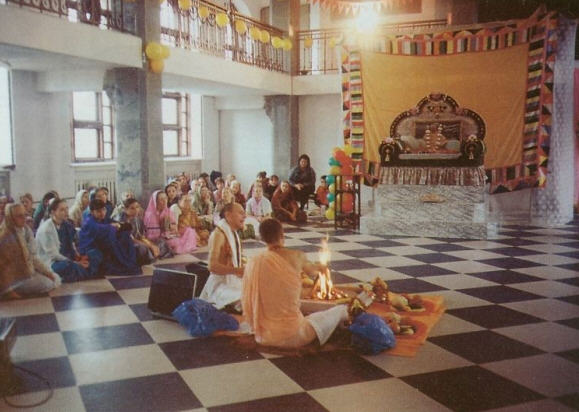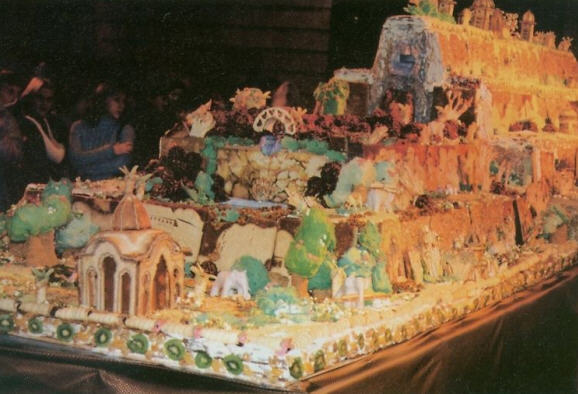"Amid the combat wreckage of yesterday and the governmental corruption of today,
Lord Caitanya's sankirtana movement stands tall, spiritually strong."
KIEV, THE CAPITAL of Ukraine, was the gateway to another dimension. Never before had I experienced this part of Europe free from the USSR it had been shackled during my previous nerve-shattering years there. Leaving the courtesy and efficiency of British Airways behind, our party of three groped our way through the hour's worth of primitive bureaucracy and outer space known as Ukrainian immigration and customs. Although the arriving passengers were few, the pointless procedures and delays were many.

The past and present of the tract of land known as the Ukraine is a tale of both bad karma and superb bhakti. Horrendous wars and persecutions have mangled the past. Now, under the guise of democracy, organized crime controls the material present. Amid the combat wreckage of yesterday and the governmental corruption of today, Lord Caitanya's sankirtana movement stands tall, spiritually strong. Prabhupada's ISKCON is healthy and dynamic here.
About sixty-five million souls occupy human bodies in Ukraine. The main city, Kiev, holds about two million of them. Would I see the people free from the brutal chains of the East's Marxism/atheism, now only to suffer the toxic fumes of the West's consumerism and pop culture? Choose your poison, but at least the free-market/democratic style of maya in the West usually allows us to spread Krsna consciousness that is, while its hedonism gradually destroys the inner fiber of the people.
Riding through the city from the international to the domestic airport, we bounced over an endless stream of potholes. Observing the surroundings, I could understand that the flood of Western glamor and glitter engulfing other former communist countries had definitely passed Ukraine by. Gray, shoddy, and disheveled, Kiev still looks like a typical East-bloc city, though the communist empire collapsed more than a decade ago.
The Ukrainian devotees driving us, however, were as shiny and sweet as a rasagulla fresh off the Lord's plate. Because I had to board a domestic flight to Odessa that same evening and I hadn't eaten all day, the devotees brought lunch prasadam for us to savor somewhere along the way.
Searching amid the drab streets and broken roads for a scenic spot for lunch, we finally just pulled over alongside the main route to the airport. I guess time was running out. On a ragged spot of weeds and grass, at a safe distance from the all-pervading roadside trash, we eagerly tasted the Lord's mercy. Never mind the dilapidated trucks and buses with ancient engines roaring a few feet away from our meal. And we ignored the smell of thick black diesel smoke that hung over our picnic site. This late lunch was our first taste of Ukrainian bhakti and it was triumphant.
Air Travel Ukrainian Style
Four hours after I landed in Kiev, I was on my way south to Odessa. (Dave and Adrian would follow, by overnight bus.) Bouncing in a small, beat-up propeller plane the official domestic flight to a major city I was happy that in my first four hours in the country we only had to pay bribes twice. The first time, on the way to the airport, a traffic cop hit up our devotee driver "for speeding." No ticket, no receipt, of course. Just hand over some cash.

The second, at the wooden bench they called the check-in counter, the airlines lady commanded that I could take my small carry-on bag with me only by paying "a small supplement." Dave and Adrian changed money to handle the bribe, as the local devotees apologized profusely: "Our country is poor; the people have to get money."
When the plane landed in Odessa, the checked baggage was waiting not in the terminal, as you would expect, but underneath the plane. You were expected to haul all your checked luggage plus your carry-ons all the way across the tarmac to the "arrivals terminal" a fence behind which people watched for their arriving friends and kin. Apparently customer service is not a factor in the airlines industry here. Somehow this frail body wearied after almost two days of continuous flying from South America rose to the challenge. Lugging all the luggage across the airfield, I reached the fence and the devotees.
With a devotional chorus of Hari bol! they eagerly grabbed my bags and escorted me to the car. Once inside, I collapsed. Contemplating the garlands they had placed on me, I remembered the famous verse from the Hari-bhakti-sudhodaya (3.11) about decorations for a dead body. Srila Prabhupada writes, "The purport is that sometimes when a friend or relative dies, especially among lower class men, the dead body is decorated. Dressed and ornamented, the body is taken in procession. That sort of decoration of the dead body has no actual value because the life force is already gone. Similarly, any aristocracy, any social prestige, or any advancement of material civilization without Krsna consciousness is as good as the decoration of a dead body."
The corpse resurrected the next morning at a devotee's house. A blissful sight greeted my waking eyes: My friends B. B. Govinda Swami and Bhakti Caitanya Swami lay peacefully at rest in the same room. I spent a jubilant day in Vaisnava merriment.
The next day, the annual Ukrainian ISKCON Festival by the Black Sea would begin. I went to bed early, determined to be well rested and ready for the main events chanting and dancing. Also, I figured that the Ukrainian devotees didn't pay for my airfare just for a dead body to attract sympathy at the festival.
Six-Day Krsna Party
The site of the six-day jamboree was a kind of health resort Ukrainian standard overlooking the sea. You've heard of five-star hotels? I'd rate this place generously at no stars. But more than twelve hundred excited devotees mostly from Ukraine, and a few from neighboring Belarus and Russia eagerly piled through the front gate. They were ready to party six intense days of hearing and chanting about Krsna.

Hearing and chanting in private certainly has its time, place, and function in our daily spiritual diet. But the scriptures explain that the taste, the rasa, intensifies during sankirtana: the congregational glorification of the Lord. Besides the standard morning program held at ISKCON temples everywhere, the festival was jammed with opportunities for deepening our attachment for the Lord.
Beginning at 10:00 A.M., seminars ran concurrently all day, with a long break for lunch. Bhakti Caitanya Swami gave "The Demons in Vraja-lilai; Prahladananda Swami presented topics from The Nectar of Devotion; Prabhavisnu Swami discussed Caitanya-caritamrta; Srutakirti Prabhu, Srila Prabhupada's personal servant for several years, delivered his memoirs to standing-room-only crowds. Niranjana Swami taught based on Prabhupada's letters in the Prabhupada-Siksamrta. Bhakti Vijnana Swami, the only Russian sannyasi, always drew big numbers. Needless to say, unlike all the other speakers, he did not require a translator. Bhakti Vikasa and B. B. Govinda Maharajas also held forth.
I presented "Vrndavana Through Uddhava's Eyes: A presentation of Vrndavana's sights, sounds, smells, inhabitants, and Krsna-lilas as seen and remembered by Lord Krsna's dear friend and advisor Sri Uddhava."
The twelve hundred guests, like eager shoppers at a large mall, went from seminar to seminar, sampling the variegated transcendental wares to their full delight.
After evening arati, devotees had a choice between bhajanas led by Bada Haridasa Prabhu and a multi-media slide show on the holy places, by Bhakti Caitanya Swami. I opted for Bada Hari's treasure chest of Vaisnava songs, since he is an old acquaintance from my Los Angeles days in the seventies. I hadn't seen him since then. Bada Hari knows seemingly countless songs and several tunes for each of them. Night after night for at least two hours after arati, and often more, Niranjana Swami played mrdanga, Bada Hari played harmonium and sang, and I chanted along vigorously and then danced with abandon whenever the wonderful bhajanas would spontaneously transform into maha-mantra kirtanas.
In Slavic countries, unlike the often excessively rationalist West, sentiments are considered serious business a profound essence of life. Ukraine certainly was no exception. Bada Hari's Vaisnava bhajanas would play on the Ukrainian devotees' heart strings, and when the worship reached its peak, you could see their swollen hearts rise up from their chest to the head. As the ecstasy energy climbed past the level of their mouth and nose, their eyeballs would start to glisten and enlarge. Finally, upon reaching the brahma-randhra, the very top of the skull, their joyous hearts would soar out, to the spiritual world.
No one at the festival seemed to have minded that the first three days were without running water. The central pump at the resort broke down, so twelve hundred devotees carried water in buckets to their rooms, for showering and washing and cleaning.
Dynamic Bhakti
After six days of this intense bhakti festival, I hit the road with Niranjana Swami, the local GBC [ISKCON Governing Body Commissioner], and Acutyapriya Dasa, the regional secretary of Ukraine, to visit temples and small centers.
By car we traveled south eight hours from Odessa to the Crimean peninsula, sticking out into the Black Sea above Turkey, and then back eight hours to Odessa, and then north eight hours to Kiev. The roads were horrible, but relishing one another's Vaisnava association, we were completely satisfied.
Everywhere in Ukraine the devotees' spirits were buoyant. I could see that because they had leaders who labored to care for them personally and to train them, and who were vigilant to protect the spontaneous missionary spirit, the idealism of Krsna consciousness was alive, well, and attracting huge numbers. The Ukrainian devotees were enthusiastic, genuine, and eager to sacrifice. Just to witness their humble yet gorgeous bhakti easily made all the austerities of traveling worthwhile. According to the European, American, or Australian standard, Ukraine is an economically downcast country, brimming with material inconveniences. Yet the devotees were, on the whole, vibrant and keen, armed with the unabashed charisma and camaraderie that makes Krsna consciousness so attractive both to newcomers and oldtimers.
Bada Hari Prabhu, a householder and father, added the grhastha perspective to the visitors' insights. He was amazed to observe how the children and even the teenagers were wellbehaved and devotional. He raises two children in Alachua, Florida, and was shocked at the difference. His conclusion? Devoid of the opportunities for the high-tech sense gratification and economic hallucination that overwhelm devotee kids in America, the Ukrainian devotee kids, in their materially unappealing circumstances, had a much better chance at becoming Krsna conscious.
In a country of 65 million people, you have a community of 2,500 active devotees that is rapidly expand-ing. The Ukrainian lesson shows how dynamic bhakti can triumph in any circumstance.
Remember Chernobyl, the worst nuclear accident in history? You guessed right it happened in Ukraine. Yet even amid such a karmic disaster area, I could see that good ISKCON leadership, a clear spiritual vision, loving care of the devotees, and dedication to Prabhupada's objectives can take you back to Godhead.
Let's follow Prabhupada's path, as he has given it to us from Bhaktisiddhanta, Bhaktivinoda, and the six Gosvamis. Then, through our attempts for pure devotion, even in this terrified world America, Ukraine, England, or Australia we can associate with Krsna.
His Holiness Devamrta Swami is based in Australia and Los Angeles. He travels regularly throughout South America and Russia.
